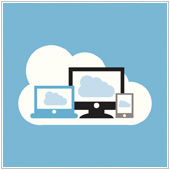 For businesses looking to integrate new systems, one of the most intriguing options is a cloud solution. It seems as if there is a solution for almost every business system. One of the increasingly popular cloud solutions being adopted by an increasing number of small to medium businesses is cloud-based ERP. Read on to learn more about what this is, and some interesting benefits it can offer businesses.
For businesses looking to integrate new systems, one of the most intriguing options is a cloud solution. It seems as if there is a solution for almost every business system. One of the increasingly popular cloud solutions being adopted by an increasing number of small to medium businesses is cloud-based ERP. Read on to learn more about what this is, and some interesting benefits it can offer businesses.
Define: Cloud-based ERP
Enterprise Resource Planning (ERP) is management software, usually offered as a bundle of applications, that aims to help businesses automate data collection, storage, management, and interpretation from various business sources like accounting, inventory, marketing, service delivery, etc.
Using this automation, business owners and managers can get an integrated real-time view of business processes, resources, and commitments. Beyond this, ERP facilitates the flow of information between departments while integrating systems used into one overall platform, thus reducing the chances of disparate data between departments.
Cloud-based ERP solutions are simply a suite of ERP apps that are delivered to users over their Internet connection, usually accessed via a browser. The software usually does not need to be installed on computers and is offered on a per-user, per-month, flat-rate fee.
Companies that have integrated cloud-based ERP solutions have experienced many benefits, five of the most common being:
Increased ERP performance
One issue many businesses come across when they implement an in-house ERP solution is that it can often require a fair amount of computer power in order to function with the highest efficiency. For small businesses this will likely mean investing in separate servers which will need to be set up and maintained. If this is executed poorly, and you could see performance drop.
Cloud-based solutions however only require a steady Internet connection, which many small to medium businesses already have. The resources to host the solution are taken care of by the provider, which means that the systems should perform better than most in-house offerings, regardless of the systems you currently have.
Decreased operating costs
An in-house ERP solution will require hardware to support it, along with knowledgeable staff to install and maintain it. For small to medium businesses, this will likely entail new hires which won’t come at a low cost.
Combine this with the fact that you will also need to actually purchase the ERP solution, and the related licenses, and it could add up to a large percentage increase in your overall IT budget.
When you choose a cloud-based ERP, you normally only have to pay a flat-rate monthly fee, which means total cost of implementation will likely be far lower. Beyond this, many providers can also manage the solution, taking care of installing and maintaining the systems. This in turn, will even out your operating costs, and if implemented correctly could even result in an overall decrease in expenses.
Enhanced access to information
Companies that don’t have any ERP will likely find that they struggle to find the information they need, when they need it. ERPs can help bring together the relevant information in a more effective manner than say spreadsheets.
Combine this with the fact that cloud-based ERP solutions are accessible via the Internet, and this means you will have access to your information from anywhere you have an Internet connection. This could in-turn increase overall business operations and make accessing information outside of the office far easier.
Increased security
Because of the nature of the information that ERP systems deal with, you are going to want to keep this secure from both outside sources and those in the company who you don’t want to have access to it.
When it comes to keeping your data safe from outside sources, most cloud-ERP solutions offer enhanced security measures which makes sure the data is secure moving from your systems to the host servers and when it is at rest.
For internal matters, data security is ensured because of how the system is accessed. You will need to access your ERP systems using an account, with each user usually being assigned their own account. Access can be controlled via central admin panels, and for people who don’t need to access, you can simply not give them an account.
Generally speaking, cloud-based ERP systems can offer enhanced security over other options, with many providers taking enhanced measures to ensure that data on their solutions is safe.
Continued support
Like other cloud solutions, cloud-based ERP solutions often offer 24/7 support. Should there be an issue, it can usually be solved quickly. Beyond this, the provider will work to keep all solutions updated. So important updates with security fixes and new features get pushed to all users immediately.
This can increase overall security as hackers have been known to attack systems using older, outdated versions of popular in-house ERP programs. It can also help make your employees more productive because if there is an issue they will be able to contact a provider who will likely be able to fix the problem far faster.
If you are looking to learn more about ERP, or Cloud-based ERP, contact us today to learn more about our solutions and how we can help.